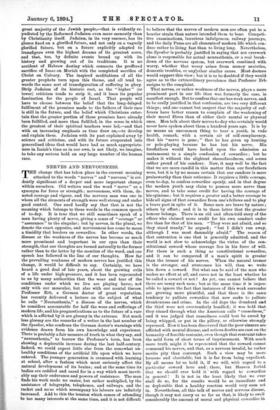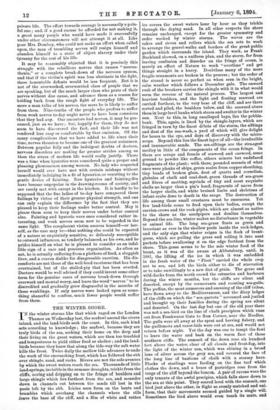NERVES AND NERVOUSNESS.
THE change that has taken place in the current meaning attached to the words " nerves " and "nervous," is evi- dently significant of a deeper and more important change within ourselves. Old writers used the word " nerve" as a synonym for force or strength ; nervousness, with them, de- noted courage and vigour, and the nervous man was one in whom all the elements of strength were well strung and under good control. One need hardly say that that is not the meaning which belongs to these words in the common speech of to-day. It is true that we still sometimes speak of a man having plenty of nerve, giving a sense of " courage " or " assurance " to the singular; but by nerves, in the plural, we denote the exact opposite, and nervousness has come to mean a timidity that borders on cowardice. In other words, the disease or the weakness of the nerves has become so much more prominent and important in our eyes than their strength, that our thoughts are turned naturally to the former rather than to the latter by the mention of the word, and our speech has followed in the line of our thoughts. How far the prevailing weakness of modern nerves has justified this change, it would be difficult to say. Certainly, we have heard a good deal of late years, about the growing evils of a life under high-pressure, and it has been represented to us by many authorities that the wear and tear of the conditions under which we live are playing havoc, not only with our muscular, but also with our mental tissues. Professor Erb, a German doctor of great reputation, has recently delivered a lecture on the subject of what he calls " Neurasthenia," a disease of the nerves, which he considers accountable for half the woes and sufferings of modern life, and his prognostications as to the future of a race which is afflicted by it are gloomy in the extreme. Not much less gloomy are the remarks of a writer in the last number of the Speaker, who confirms the German doctor's warnings with evidence drawn from his own knowledge and experience. There is probably a fair measure of truth in what they say, and "neurasthenia," to borrow the Professor's term, has been showing a deplorable increase during the last half-century. Indeed, we could expect little else from the somewhat un- healthy conditions of the artificial life upon which we have entered. The younger generation is crammed with learning at school, after a fashion which must seriously affect the natural development of its brains; and at the same time its bodies are coddled and cared for in a way which must inevit- ably sap their endurance and powers of resistance. The man finds his work made no easier, but rather multiplied, by the assistance of telegraphs, telephones, and railways, and the racket and nose which accompany his labours are infinitely increased. Add to this the tension which comes of attending to too many interests at the same time, and it is not difficult to believe that the nerves of modern men are often put to a heavier strain than nature intended them to bear. Competi- tive examinations, luxurious indulgences, railway journeys, and the daily Press are all elements of modern life which con- duce rather to living fast than to living long. Nevertheless, the Speaker is probably justified in saying that not overwork alone is responsible for actual neurasthenia, or a real break- down of the nervous system, but overwork combined with worry, whether that worry arises from money anxieties, domestic troubles, or anytother similar cause. Most doctors would support this view ; but it is to be doubted if they would agree as to the extraordinary prevalence that Professor Erb assigns to the complaint.
That nerves, or rather weakness of the nerves, plays a more prominent part in our life than was formerly the ease, is manifest enough. But to confess that one has weak nerves, and to be really justified in that confession, are two very different- things ; and one cannot but suspect that the majority of suf- ferers have better reason to complain of the weakening of their moral fibres than of either their mental or physical ones. Men talk about their nerves to-day who certainly would never have spoken about them a hundred years ago. It is by no means an uncommon thing to hear a youth, in rode health, remark, with a certain air of self-complacency, that his "nerve is gone ; " that he has given up hunting- or polo-playing because he has lost his nerve. His forefathers would have looked upon the admission as tantamount to a simple confession of cowardice ; but he makes it without the slightest shamefacedness, and seems rather proud of his candour. Now, it may well be the fact- that we are more candid in this matter than our forefathers were, but it is by no means certain that our candour is more praiseworthy than their reticence. It requires a little courage, even to-day, to confess cowardice openly, and in that degree the modern youth may claim to possess more nerve than nerves, and to take some credit for having the courage of his opinions ; but it requires a greater and a better courage to- hide all signs of that cowardice from one's fellows and to play a brave part in spite of it. Some men are brave by nature ; others by effort ; and it is to these latter that the greater honour belongs. There is an old and often-told story of the officer who claimed more credit for his own conduct under fire than for that of his men. " They were not afraid, and so they stood steady," he argued ; " but I didn't run away, although I was most damnably afraid." The reason of that contention is one that is generally admitted, and the world is not slow to acknowledge the virtue of the con- stitutional coward whose courage lies in his force of will. For there is such a thing as constitutional cowardice, and it can be conquered if a man's spirit is greater than the tremor of his nerves. When the natural tremor is the stronger, and overcomes his will, then we write him down a coward. But what can be said of the man who makes no effort at all, and cares not in the least whether he be called a coward or not P As yet, one cannot believe that there are many such men ; but at the same time it is impos- sible to ignore the fact that instances of this weak surrender are growing more plentiful, and that there is the same tendency to palliate cowardice that now seeks to palliate drunkenness and crime. In the old days the drunkard and the thief were not over-tenderly handled; it was held that they sinned through what the American calls " cussedness," and it was judged that cussedness could best be cured by being whipped, or put in the pillory, or otherwise strongly repressed. Now it has been discovered that the poor sinners are afflicted with mental disease, and serious doubts are cast on the humanity of forcible restraint, even though that restraint takes the mild form of short terms of imprisonment. With much more truth might it be represented that the coward cannot command his nerves, and that, as a nervous invalid, he rather merits pity than contempt. Such a view may be more humane and charitable, but it is far from being expedient. By all means let us hold it, if we will, with regard to a particular coward here and there, but Heaven forbid that we should ever hold it with regard to cowardice in general ! It is not in the least likely that we ever shall do so, for the results would be so immediate and so deplorable that a healthy reaction would very soon set in. Nevertheless, all this talk of nerves and nervous disease, though it may not carry us so far as that, is likely to swell considerably the amount of moral and physical cowardice in private life. The effort towards courage is necessarily a pain- ful one ; and, if a good excuse be afforded for not making it, a great many people who would have made it successfully under other circumstances will not attempt it at all. Like poor Mrs. Dombey, who could not make an effort when called upon, the man of trembling nerves will resign himself and abandon himself to a state of abject slavery under their tyranny for the rest of his life.
It may be reasonably objected that it is precisely this struggle with the rebellious nerves that causes "neuras- thenia," or a complete break-down of the nervous system, and that if the victim's spirit was less obstinate in the fight, these lamentable defeats would be less frequent. But it is not of the overworked, overworried class of people that we are speaking, but of the much larger class who prate of their nerves without due cause, and advance them as a reason for 'holding back from the rough fight of everyday life. The more a man talks of his nerves, the more he is likely to suffer from them. Nine-tenths of the people who profess to suffer from weak nerves to-day ought never to have been conscious 'that they had any. Our ancestors had nerves, it may be pre- sumed, just as we have ; but, happily for them, they do not seem to have discovered the fact, and their life was not rendered less easy or comfortable by that omission. Of the many complications that we have added to life since their time, nerves threaten to become one of the greatest nuisances. Between popular folly and the indulgent doubts of doctors, nervous disorders are making far greater strides among us than the stress of modern life would really justify. There was a time when hysterics were considered quite a proper and pleasing phenomenon among women. No lady who respected herself would ever have met with certain mishaps without immediately indulging in a fit of hysterics, or resorting to the gentle device of fainting. Now hysterics and fainting-fits have become unpopular in the drawing-rooms of society, and are rarely met with except in the kitchen. It is hardly to be supposed that the fine ladies of to-day have conquered these failings by virtue of their greater physical strength, and one can only explain the difference by the fact that they are pleased to keep their feelings under better control. May it please them soon to keep their nerves under better control also. Fainting and hysteria were once considered rather in- teresting, and weak nerves seem now to be regarded in the same light. The complacent victim assures himself—or her- self, as the case may be—that nothing else could be expected of a nature so exquisitely sensitive, so delicately susceptible to outward influences, so tenderly balanced, as his own, and he prides himself on what he is pleased to consider as an infal- lible sign of a rare and precious organisation. As often as not, he is actually suffering from a plethora of food, a sluggish liver, and a craven dislike for disagreeable exertion. His dis- comforts are not those of the well-bred racehorse that has been overtrained, but of the stalled-pig that has been overfed.
Doctors would be well advised if they could invent some other
term for the genuine cases of nervous break-down through overwork and mental worry, and leave the word " nerves " to be discredited and gradually grow disgraceful in the mouths of these weaklings. If only nerves were looked upon as some- thing shameful to confess, much fewer people would suffer -from them.











































 Previous page
Previous page